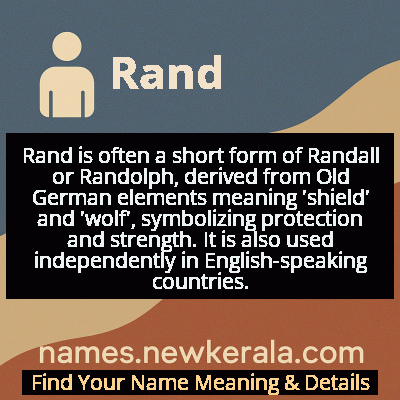Rand Name Meaning & Details
Origin, Popularity, Numerology Analysis & Name Meaning of Rand
Discover the origin, meaning, and cultural significance of the name RAND. Delve into its historical roots and explore the lasting impact it has had on communities and traditions.
Name
Rand
Gender
Male
Origin
Christian
Lucky Number
1
Meaning of the Name - Rand
Rand is often a short form of Randall or Randolph, derived from Old German elements meaning 'shield' and 'wolf', symbolizing protection and strength. It is also used independently in English-speaking countries.
Rand - Complete Numerology Analysis
Your Numerology Number
Based on Pythagorean Numerology System
Ruling Planet
Sun
Positive Nature
Leaders, ambitious, highly driven, self-reliant, innovative.
Negative Traits
Overly aggressive, domineering, impatient, selfish.
Lucky Colours
Red, orange, gold.
Lucky Days
Sunday.
Lucky Stones
Ruby, garnet.
Harmony Numbers
2, 3, 9.
Best Suited Professions
Entrepreneurs, managers, engineers.
What People Like About You
Courage, determination, leadership.
Famous People Named Rand
Rand Paul
Politician
United States Senator from Kentucky known for libertarian-leaning political views and medical career
Ayn Rand
Author and Philosopher
Influential novelist and philosopher who developed Objectivism, author of 'Atlas Shrugged' and 'The Fountainhead'
Randall 'Rand' Miller
Game Developer
Co-creator of the groundbreaking Myst computer game series that revolutionized interactive storytelling
Randall 'Randy' Rhoads
Musician
Legendary guitarist for Ozzy Osbourne who revolutionized heavy metal guitar playing before his tragic death
Name Variations & International Equivalents
Click on blue names to explore their detailed meanings. Gray names with will be available soon.
Cultural & Historical Significance
In the 20th century, the name gained unprecedented cultural significance through Ayn Rand, whose philosophical novels and Objectivist philosophy created a lasting intellectual movement. Her works, particularly 'Atlas Shrugged' and 'The Fountainhead,' have sold millions of copies worldwide and continue to influence political and economic discourse. This association has made 'Rand' synonymous with radical individualism and free-market capitalism in certain circles. Meanwhile, in popular culture, characters like Rand al'Thor from 'The Wheel of Time' series have introduced the name to new generations of fantasy readers, maintaining its relevance in contemporary storytelling.
Extended Personality Analysis
Individuals named Rand are typically characterized by strong independent thinking and a natural inclination toward leadership roles. They often possess analytical minds that enjoy deconstructing complex problems and developing systematic solutions. This intellectual curiosity frequently manifests as a tendency to question established norms and develop personal philosophical frameworks. Rands are generally perceived as reliable and protective, living up to the name's original meaning of being a 'shield' for those they care about. Their combination of intellectual rigor and protective instincts makes them effective advocates and problem-solvers.
Socially, Rands often display a balance of confidence and reserve, comfortable in leadership positions but sometimes struggling with emotional expressiveness. They tend to form deep, loyal relationships rather than numerous superficial connections. Their principled nature can sometimes be misinterpreted as stubbornness, as they typically require compelling evidence to change strongly held beliefs. However, this same quality makes them trustworthy and consistent in their commitments. Many Rands exhibit a unique blend of practical problem-solving skills and abstract thinking capabilities, allowing them to navigate both concrete challenges and philosophical questions with equal competence.
Modern Usage & Popularity
In contemporary naming practices, Rand maintains a steady though modest presence, appealing particularly to parents seeking strong, single-syllable names with historical and philosophical depth. While it has never broken into the top 1000 most popular names in the United States, it enjoys consistent usage across English-speaking countries, with periodic spikes in popularity following media coverage of prominent figures like Senator Rand Paul. The name's appeal lies in its combination of strength, simplicity, and intellectual associations. Modern parents often choose Rand for its easy pronunciation, distinctive sound, and the values it represents - independence, strength, and principled thinking. It functions effectively as both a standalone name and as a shortened form of Randall, with the abbreviated version conveying a more modern, streamlined aesthetic. The name's literary and philosophical connections make it particularly popular in academic and professional circles, while its simplicity ensures broad accessibility.
Symbolic & Spiritual Meanings
Symbolically, Rand embodies a rich tapestry of meanings that have evolved from its ancient roots to contemporary associations. The original Old English meaning of 'wolf's shield' combines two powerful protective symbols: the wolf represents intelligence, loyalty, and fierce protection of family, while the shield symbolizes defense, security, and resilience against adversity. This creates a name that suggests both the strength to protect and the wisdom to discern what deserves protection. In modern contexts, the name has acquired additional layers of symbolic meaning through cultural figures like Ayn Rand, now representing intellectual courage, principled individualism, and the defense of personal liberty. The name evokes the image of someone who stands firm in their convictions while maintaining the flexibility to adapt to changing circumstances. It symbolizes the delicate balance between fierce independence and protective responsibility that characterizes effective leadership and meaningful personal integrity.

